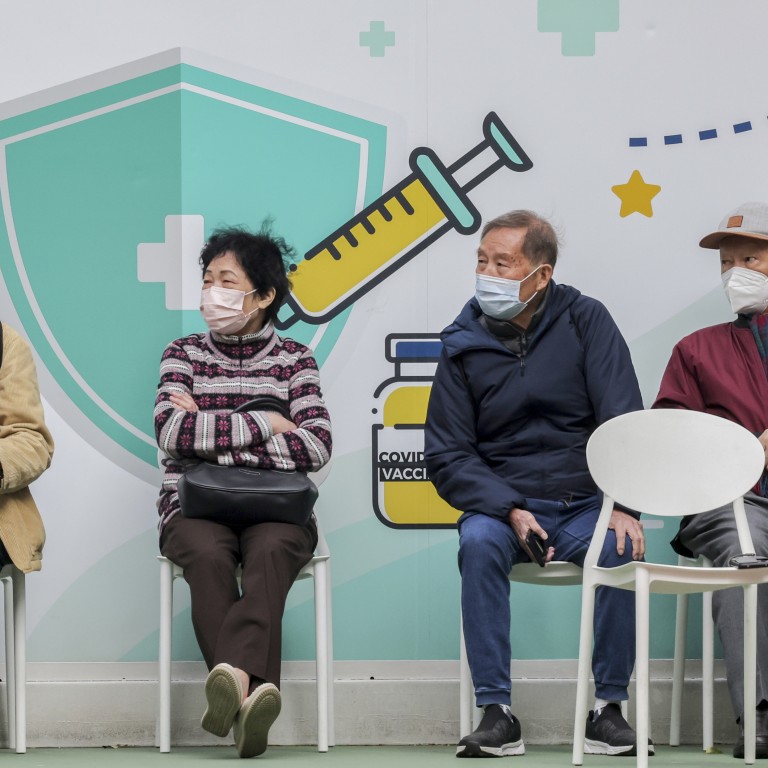
Hong Kong to receive first batch of Covid-19 vaccines targeting XBB variant ‘by end of the year’
- Source says one batch of vaccines arriving end of this year, and other to be delivered in early 2024
- Administrative work will still need to be done, another insider says, and government is advising residents not to wait for their arrival if they are in need of booster
Hong Kong will receive its first batch of Covid-19 vaccines targeting the XBB variant by the end of this year, the Post has learned.
Secretary for Health Lo Chung-mau on Thursday said the government had bought the third-generation inoculations and hoped they could be delivered “soon”, as authorities announced the end of the summer flu season which began in late August.
“The initial supply may be limited and will arrive in Hong Kong in batches,” Lo said. “We will first vaccinate high-risk patients with the XBB-targeting vaccines.”
Makeshift Hong Kong Covid hospital expanding services to ease ‘pressure points’
A source familiar with the matter said one batch of vaccines would arrive by the end of this year, and other would be delivered in early 2024.
The insider said the quantity of the first batch was expected to be in the “tens of thousands”.
“Some administrative and IT work will be needed before jabs are given out,” another source said, without elaborating when the vaccines could be made available to the public.
Lo urged the public not to wait for the vaccines to land, telling them to get a booster shot if six months had passed since their previous dose.
“The inactivated and mRNA vaccines could still offer sufficient protection as a booster dose,” he said, referring to the two types of inoculation available.

Last month, the two scientific committees under the Centre for Health Protection jointly recommended the vaccine targeting the XBB variant as a “preferred” choice when available.
Experts of the committees said people at the greatest risk of severe Covid-19, such as the elderly living in residential care homes, should be given a higher priority to receive the XBB vaccine in case of limited local supply.
Specialists at last month’s meeting reviewed data from vaccines aimed at the XBB variant made by US drug firms Pfizer and Moderna.
Sources declined to disclose which brands the government had bought.
A spokesman for Moderna said it was discussing with relevant departments and waiting for a decision from the authorities.
Experts recommend Hongkongers receive latest Covid jab targeting XBB strain
“The allocation of vaccine batches for Hong Kong and the post-arrival administration plan will be determined following an approval decision, and after consultation with the relevant departments,” the spokesman said.
“Moderna is committed to supplying the XBB vaccine to Hong Kong as early as possible, pending approval.”
The Post has approached also Fosun, which is responsible for the Pfizer Covid-19 jabs in Hong Kong, for comment.
XBB is the most prevalent Covid-19 variant in the city, accounting for more than 99 per cent of cases.
The government-subsidised vaccination programme at present includes first-generation monovalent vaccines produced by Pfizer and Sinovac, as well as the former’s second-generation shots, which are based on the original virus strain and the Omicron variant.
Hospital Authority chief warns of flu surge as Hong Kong enters mask-free winter
The city’s Covid-19 infections remain stable, according to the Centre for Health Protection data.
Flu infections returned to the baseline level last week, prompting the government on Thursday to announce the 10-week summer flu season had ended.
Health authorities said the percentage of flu-positive respiratory specimens handled by public laboratories, as well as the public hospital admission rate of people diagnosed with influenza, had also returned to regular levels.
The number of flu infections dropped to 23 last week, from 91 in mid-September. Severe cases also plunged from 51 in the final week of September to 28 last week.
But authorities have urged residents to stay vigilant. “Based on historical data, influenza season usually arrives in the winter months,” a spokesman for the Centre for Health Protection said.

